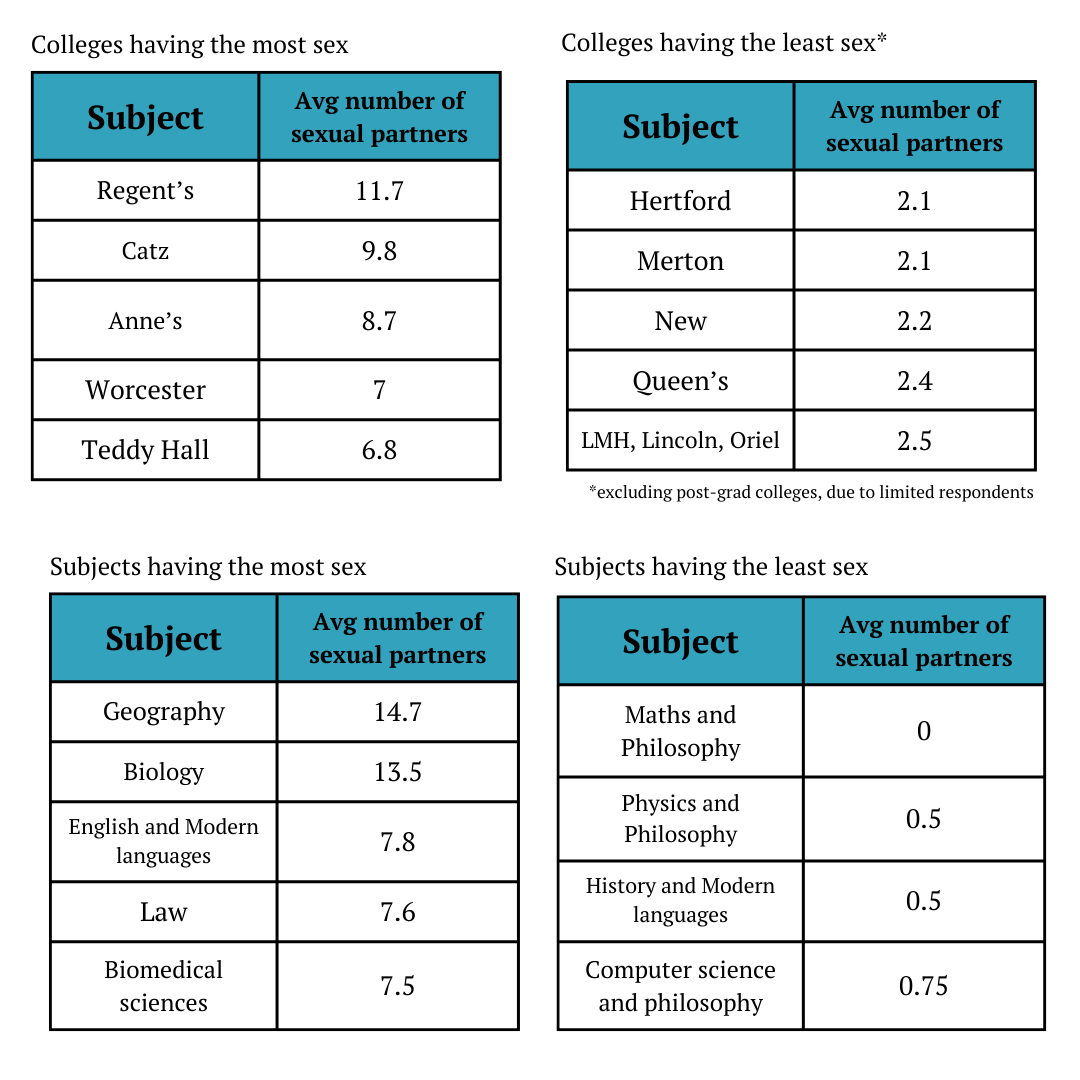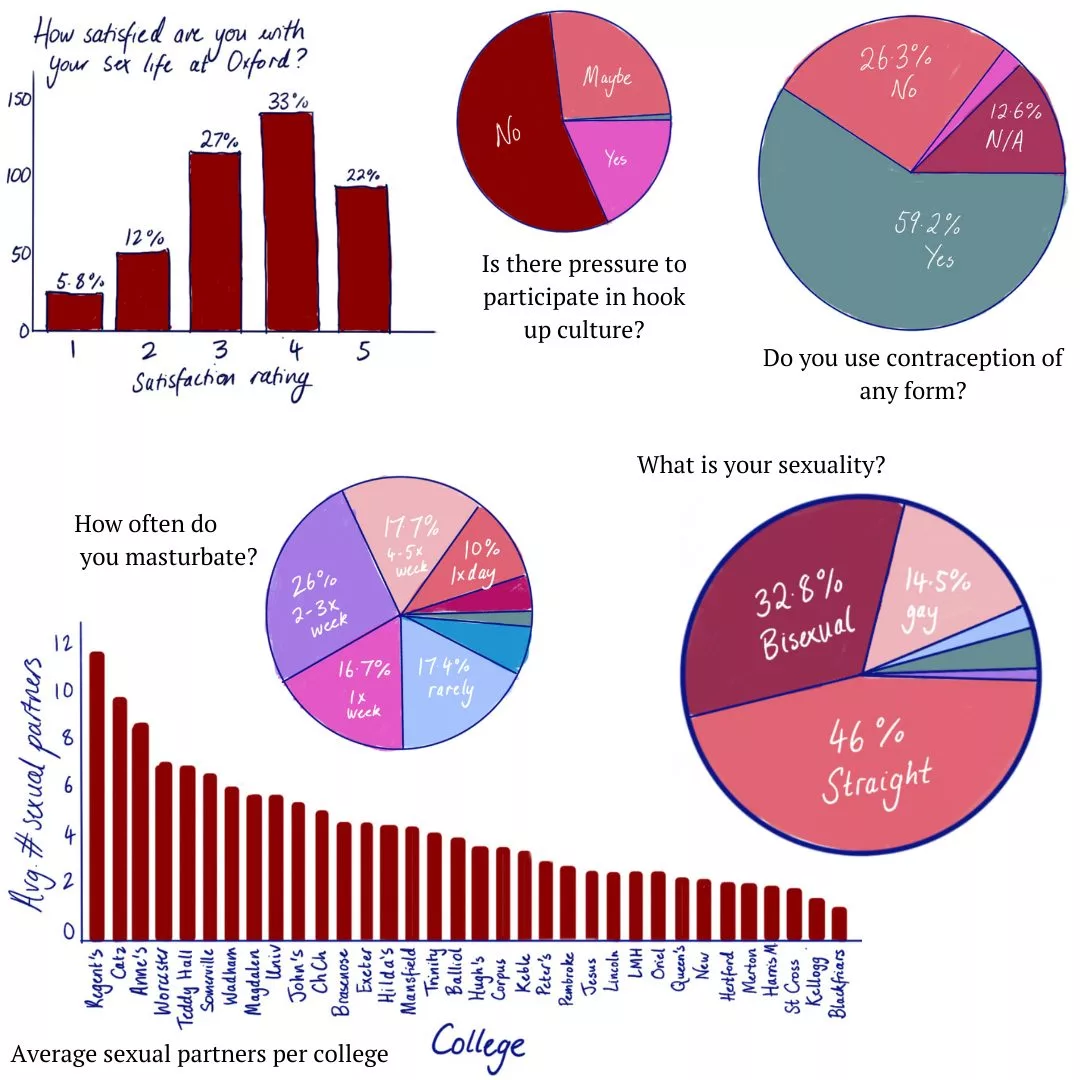Cherwell’s “Sextigation” is back and better than ever. After 450 responses and some pretty groundbreaking analysis that followed, the results are in.
This year, 55% of respondents were female, 38.5% were male, and 5.6% were non-binary. In a slight dip from last year’s survey, the (mean) average number of sexual partners comes in at 4.5, compared with the 5 from last year. Taking a closer look at the numbers yields a different picture. For female students, the mean average is 3.9 sexual partners, with a median of 2. The mean male student has had 5.2 partners with a median of 2 as well. Non-binary students come out on top with an average of 6.2 sexual partners, with a median of 3.
However, not all students share the same experiences. 13.2% of Oxford students have had no sex since matriculating, with 9.9% of students having never had sex before. The most common number of sexual partners for an Oxford student, since being at Oxford, was 1, at 28.9%.
As they say, good things come in threes. 69 respondents (lol) claimed to have had sex with two or more people at once, with 18 students confessing to a threesome, 4 to a foursome, and 1 to a five-and-sixsome respectively. Having googled the term ‘orgy’ to find it constitutes 4 or more people, perhaps having that as a single category would have sufficed. However, the survey’s level of detail was not lost on the two adventurous students who clocked in with a tensome each.
Knocking St Peter’s from their throne, this year, Regent’s Park took the trophy for sexiest college, with their students averaging a whopping 11.7 sexual partners since being at Oxford. Close in the runnings were Catz, Anne’s and Worcester, whose students averaged 9.8, 8.6 and 6.9 sexual partners respectively. At the other end, Blackfriars, Kellogg, St Cross and Harris Manchester came bottom of the pile, doing a disservice to Dominicans, post-grads and mature students everywhere.
Whilst Peter’s has been relegated to the middle of the pile, Merton, who came second in last year’s survey, is the undergraduate college whose students have had the fewest sexual partners since matriculation, averaging just over 2. Clearly, the singular Mertonian who drove up the average last year has since moved on to bigger and better things.
As for satisfaction levels, this year has seen Oxford graduate from 2023’s ‘mid’ to an average score of 3.5/5. In fact, an encouraging majority of students (82%) would rate their sex lives at a 3/5 or above. Even so, some people had gripes with the “conservative” nature of Oxford’s sex scene, with one student expressing frustration: “too! Vanilla!!!”. Breaking down satisfaction ratings by college reveals a more marked difference, too. While Queen’s students rate their sex lives 4.4/5 , bad news for LMH students who sit at the bottom of the pile with an average rating of 2.6/5.
This year, Geography takes the lead as the top-shagging degree, boasting a whopping 14.7 average number of sexual partners since coming to Oxford. This is followed by Biology (13.5), English and Modern Languages (7.8), Law (7.6), and Biomedical Sciences (7.5). This is almost an exact return to 2022’s “degrees which get the most action”, with last year’s top shaggers, the medics, taking a backseat. Geography has been the only degree consistently in the top 5 of each Sextigation.
On the flip side, Maths and Philosophy come in as the subject having the least sex, with an average number of 0 partners post-matriculation. They are followed by Physics and Philosophy, History and Modern Languages (both with 0.5), and Computer Science and Philosophy (0.75).
Low body count does not necessarily mean an absence of sex, however (apart from for Maths and Philosophy students, sorry). 70.9% of respondents in a relationship of any kind reported having sex more than once a week with their partner. Quite impressively, 7.4% of respondents overcame the challenging Oxford work-life balance, recording that they have sex with their partner multiple times a day. Perhaps this is made easier by proximity: 32.1% of students admitted to having had a relationship with a member of their college.
Importantly, where mutual pleasure eludes us, in Oxford, self-love is always close at hand. When asked about masturbation, the majority of respondents said they masturbate at least 2-3 times a week, and nearly 3 in 4 do so at least once a week. Male respondents were the most frequent masturbaters, with over half saying they masturbate at least 4-5 times a week, whereas 8.6% of female respondents said that they never masturbate. Meanwhile, 1.2% of male respondents, and all non-binary respondents said that they masturbate at least once in a while. Whilst the most popular frequency of masturbation for both female and non-binary respondents was 2-3 times a week, male respondents preferred masturbating 4-5 times a week, with 1 in 4 saying that they do so at least every day.
A major development from last year’s survey is that the percentage of queer and questioning respondents has officially overtaken the percentage of heterosexual respondents, with the proportion of heterosexual respondents falling from 50.4% to 46%. The makeup of queer respondents is as follows: 32.8% bisexual, 14.5% gay, 1.8% pansexual. 4.9% don’t know or prefer not to say.
The average partner count for queer people since matriculation is higher than for straight people by one whole person (4.6 vs 3.5), whilst the total partner count for LGBTQ+ was 9.1, vs 5.4 for straight respondents, suggesting that LGBTQ+ beat straight respondents at Oxford and have more sexual experience before coming by an even greater margin. One respondent summed up the scene wistfully: “so much sex, so little time…”. Though one respondent said that the dating pool offered “too much choice tbf it’s like trying to shop at one of them massive tesco(s)”, others noted its limited size. One respondent wrote that “everyone has shagged everyone.” Another particularly effusive respondent said: “There is a tiny pool, and an even tinier selection of attractive / genuinely normal queer people (ie a lot are a bit too unhinged etc for me),” noting Oxford’s peculiar standards for sexual eligibility: “Being attractive and confident often is seen by others as being narcissistic or a bitch (in this city), so weirdly I don’t get nearly as much attention here as I do in other cities etc.” Others, however, enjoy the drama: “It’s messy, we love it”.
There is a marked difference in hookup culture for sexual orientations. Several gay men complained about being pressured into engaging in frequent casual sex, more so than other demographics, and while hookups may be easy to find, one respondent characterised the dating scene as “horrific”. “The stress of life here (and) the fact everyone’s always busy means that many are inclined towards casual sex/hookups”, contemplated one student.
Particularly those seeking female partners reported difficulty: “There are no lesbians here!!!”, said one such respondent. Several bisexual women commented on the difficulties of finding female partners, with one person replying that the experience is “upsetting in the way it sometimes feels like I’m contributing to the erasure of my own identity”.
But while some find “the Oxford gay scene is grim”, for others it has been an “incredible” chance to explore their sexuality in a city with a “much higher volume” than other places. “Shout out to tuesgays”, remarked one respondent.
Speaking of, the best place to find hookups in Oxford was Plush, receiving the highest percentage of votes at 24.8%. This checks out with the 6 people who admitted the weirdest place they’d had sex in Oxford was the Plush dancefloor/toilets (but only “briefly before being asked to leave…”). While Atik and Bridge offer similar opportunities at 17.7% and 14.8%, respectively, don’t bother trekking to Cowley if you’re looking for a fling: O2 Academy and Bully only received 2.2% of the total votes.
Casual sex is not overwhelmingly popular with Oxford students, with 42.3% of respondents reporting they had not had a one-night stand before. Even so, there was a large range in those who had experienced one-night stands, from the most significant portion having had a one-night stand 2-4 times (43.2%), to the 14 respondents who reported over 20. However, there remains the challenge of deciphering the intentions of those inviting you back, as highlighted by one respondent’s memorable encounter. This experience involved a wrestling fetish, donning leotards, and staying up until 3 am with the initial guy and his unexpected friend.
On hook-up culture in general, 54.6% of respondents found that there was no real pressure to participate in it, or at least the pressure was “not worse than anywhere else” and was “just the same as other uni culture”. “It’s easily accessible for those who want to find it but there’s not a pressure to participate”, summed up one respondent. As for why, one person commented “everyone’s doing too much work to fuck around”, while another supplied a different reason: “people are clapped”.
However, a significant minority of people who responded either with yes or maybe – 18.7% and 26.2% respectively – worried that there was an expectation to sleep with people they had got with in a club, with one respondent noting “you can’t really get with anyone in a club without being told you have to go back to their accommodation”. Similar pressures were sometimes present while dating, with one student commenting, “when I’ve gone on dates the expectation seems to be to hook up”.
A related aspect of Oxford’s sex life is slut shaming. A third of respondents – 33.5% – felt that there was a culture of shaming people for promiscuity. It seems that this is more nuanced than “actual slut SHAMING”. Instead, it underlies the lighthearted merriment of “things like sconcing on crewdates” – as explained by one respondent, “even though it is funny, getting sconced every couple of weeks for something that happened once can start to feel a bit like a form of slut shaming, especially for girls”.
29.8% of students answered that they do use dating apps to find sexual partners, with Hinge being the most popular dating app, beating Bumble, Tinder, and Grindr. Students seem to use dating apps for a variety of purposes, mostly with the intent of finding longer relationships: “most people… are looking to meet people and go on dates more than just hook up”, wrote one student. For the LGBTQ+ community, however, dating apps seemed more limited in providing opportunities to meet partners, who are “few and far between”, due to the limited user base.
Regarding the types of relationships Oxford students enter with each other, 51.1% of respondents answered that they had entered an ‘official’ relationship while at Oxford. As some students noted, the culture in Oxford seems to be “way more focused on serious relationships or at least fwb”. While universities, in general, can provide the meet-cute needed for any good love story, Oxford is apparently the 2nd university in the UK where you are most likely to marry the partner you meet here, at 21%, aligning with the 36% of respondents who have had an official relationship of a year or more. Situationships followed, with 40.5% of participants having not put a label on it, and one student creating their own category of relationship: “‘Pure delusion :D”.
When it comes to sex positions, missionary – including related sex positions, such as “eagle” or “legs in the air” – was most popular. Of the 268 people who gave a preference, 33.2% said that missionary was their preferred position, with cowgirl coming in second at 24.2%. Notably, missionary was the most popular position for both female and male respondents, whilst cowgirl took the prize for non-binary respondents. However, whereas 17.7% more male respondents opted for missionary than the second most popular position, cowgirl, for female respondents, missionary, doggystyle and cowgirl all came within 4.8% of one another. Although roughly the same proportion of female respondents as male ones nominated cowgirl as their sex position of choice, 4.9% more female respondents than male respondents said that doggystyle was their favourite, and around 7.4% of both female and male respondents chose speed bumping. Oral sex was nominated overwhelmingly by non-binary respondents, with no female respondents saying that it was their go-to.
For some respondents, it was not the position, but satisfaction that counts above all. Viewing the question in a more abstract sense, one respondent wrote that their preferred position was “seeing her happy.” Another respondent was either flustered by the subject matter or spoilt for choice, writing: “I don’t know 😔😔.” Others were fans of some more niche positions including “seashell,” “the big dipper,” and – the ominously titled – “French delivery.” Nevertheless, nearly 80% of those who gave a preference said that either doggystyle, cowgirl or missionary were their favourites. Evidently, when it comes to go-to sex positions, in Oxford, you can’t go wrong with a classic.
There has been little change in relation to the safety of sex in Oxford since last year. This year, 59.2% of respondents said they ensure that some kind of contraception is used when having sex, whilst 26.3% said that they do not, up a perhaps concerning, but marginal 2.5% on last year’s survey. Much like last year, condoms were the most used form of contraception, used by 51.6% of people who use contraception. As regards the differing attitudes towards contraception of female, male and non-binary respondents, the differences were relatively minor. Whilst female respondents were most likely to ensure contraception was used – 71.1% of female respondents who gave a definitive answer said that they did so – non-binary respondents were the least likely to, with only 63.2% answering positively.
Besides being “too! vanilla!!!”, we wondered whether there were any other peculiarities that make sex at Oxford stand out. Some respondents noted with great fondness some classic aspects of the Oxfordian sex life. One in particular recalled “leaving someone at 5am to go to rowing practice,” whilst another reminisced about “being asked for my LinkedIn after a hook-up,” a testament to how truly no kind of relationship is sacred for Oxford hacks and careerists. Another respondent ruminated that “less neeks would vastly improve the quality of sex at Oxford.”
The city of dreaming spires is naturally home to some more unconventional locations where one might “get jiggy with it.” Particularly astounding was one respondent, among the 43.1% of respondents who confessed to having had sex in a public place, who “had sex in the Bridge of Sighs,” noting that “it is really difficult to have sex in the Bridge of Sighs but I managed it.” Other notable sex spots included: the Radcam, the Sackler, apparently everywhere in New College, Exeter College chapel, the alleyway between the two Spoons pubs, St John’s boat house, Green Templeton’s garden, and “… Brasenose.”
Some students noted their frustration with Oxford sex life. One respondent took issue with its stiffness in particular, writing that “everyone needs to loosen up.” Another wrote regretfully, “I wish I hadn’t had sex here. I’d have been happier waiting until marriage.” Others noted troubles in finding sexual or romantic partners around Oxford. Besides expressions of disappointment such as “How do people ever enter relationships with each other?”, another respondent spoke to a feeling of alienation arising from Oxford’s clubbing culture: “It’s just hard to get into if you don’t go clubbing, I think. Lots of people just want one-night stands while they’re drunk, not friends-with-benefits arrangements or, God forbid, proper relationships.” Finally, while this sex survey sheds insights into the varied and diverse sex life of the Oxford student, one student remarked that they wished “people were more open about their sex lives, not because I want to be creepy or anything, but just because it would help me rationalise it all better (and hopefully let me know I’m not alone in my inexperience)”.
On a more serious note, a number of respondents expressed concern at the normalisation of sexual assault within Oxford: “the prevalence of sexual assault and rape here is absolutely insane. Even worse is the acceptance from the rest of the cohort, and apparent mission to protect their reputations once they find out”. Others noted the lack of education around consent, and that “some people arrive here and have NO boundaries”. But the problems seem to start earlier than Oxford – with one student attributing such attitudes to the culture in same-sex private schools, a reminder of the Everyone’s Invited initiative, which began in 2020 to eradicate rape culture, and allowing survivors to share stories. Within Oxford too, then, it seems there needs to be a change in countering such normalised practices, to “hold people accountable”.
Concerned with the betterment of the sexual experience in Oxford, a number of students proffered insightful words of wisdom and advice. “Don’t f**k your ex or lend them £2,000,” wrote one student, whilst another suggested that the “walls ought to be thicker because I can hear you f***rs screaming.” Another took issue with the stiffness of Oxford sex life, saying “everyone needs to loosen up.” Whilst “Oxford has really hot women,” another respondent noted that “Oxford men are very disappointing (sorry).” One respondent suggested that a solution to this problem would be to “branch out from Uni of Oxford men” to other male residents, writing that “Oxford Brookes were better, but better still were the flight school and people who work around the city.” Good to know.
Despite the generally sex-positive attitudes students expressed, we found that there sometimes is a lack of conversation talking about sex at Oxford. While some students celebrated their friends as providing a “supportive”, “open, respectful”, space, others noted that “everyone seems to be having it [sex] but nobody ever talks about it”. Perhaps then the answer is openness, normalising conversations to understand that there is no singular sexual experience which defines the average Oxford student. As the wise Salt-N-Pepa once proclaimed: “Let’s talk about sex”.




